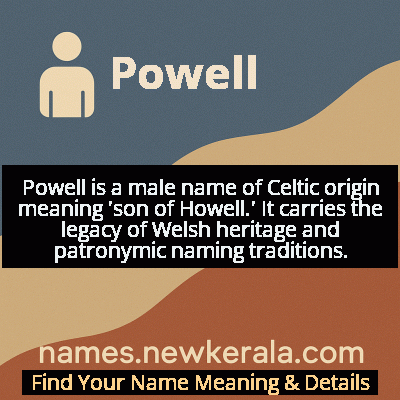Powell Name Meaning & Details
Origin, Popularity, Numerology Analysis & Name Meaning of Powell
Discover the origin, meaning, and cultural significance of the name POWELL. Delve into its historical roots and explore the lasting impact it has had on communities and traditions.
Name
Powell
Gender
Male
Origin
Celtic
Lucky Number
2
Meaning of the Name - Powell
Powell is a male name of Celtic origin meaning 'son of Howell.' It carries the legacy of Welsh heritage and patronymic naming traditions.
Powell - Complete Numerology Analysis
Your Numerology Number
Based on Pythagorean Numerology System
Ruling Planet
Moon
Positive Nature
Diplomatic, friendly, artistic, empathetic.
Negative Traits
Over-sensitive, moody, indecisive, prone to self-pity.
Lucky Colours
Green, cream, white.
Lucky Days
Monday.
Lucky Stones
Pearl, moonstone.
Harmony Numbers
1, 3, 4.
Best Suited Professions
Diplomats, mediators, caregivers, artists.
What People Like About You
Cooperative spirit, friendliness, artistic talent.
Famous People Named Powell
Colin Powell
Statesman and Military Leader
First African American Secretary of State and Chairman of the Joint Chiefs of Staff
Bud Powell
Jazz Pianist
Revolutionary bebop pianist who transformed jazz piano technique
William Powell
Actor
Acclaimed Hollywood star known for 'The Thin Man' series and sophisticated roles
John Wesley Powell
Explorer and Geologist
First documented expedition through the Grand Canyon and director of US Geological Survey
Name Variations & International Equivalents
Click on blue names to explore their detailed meanings. Gray names with will be available soon.
Cultural & Historical Significance
The name carries the legacy of Welsh nobility and legal tradition while also representing the adaptation of Celtic identity within broader British and eventually global contexts. Many Powells migrated to the Americas during colonial times, spreading this Celtic heritage worldwide. The name's evolution from patronymic to established surname mirrors the broader story of Welsh cultural preservation and adaptation, making it a significant marker of Celtic diaspora identity. Today, Powell remains one of the most recognizable Welsh surnames globally, serving as a living connection to Celtic linguistic and cultural traditions.
Extended Personality Analysis
Individuals bearing the name Powell are often perceived as possessing strong leadership qualities, practical wisdom, and a grounded approach to life. The name's association with 'son of Howell' and its Welsh noble origins suggest characteristics of responsibility, tradition-awareness, and natural authority. Powells are typically seen as reliable, methodical problem-solvers who approach challenges with careful consideration rather than impulsive action. They often exhibit a blend of Celtic creativity with pragmatic thinking, making them effective in both artistic and organizational roles.
The historical connection to Hywel Dda, known for establishing wise laws, implies a sense of justice and fairness in their decision-making. While maintaining respect for tradition, Powells also demonstrate adaptability—a trait reflected in the name's evolution from Welsh patronymic to established surname across different cultures and eras. This combination of steadfast principles with flexible application makes them particularly effective in roles requiring both integrity and innovation. Their personality often reflects the Celtic values of community, storytelling, and deep connection to heritage, balanced with the practical demands of modern life.
Modern Usage & Popularity
In contemporary usage, Powell remains primarily a surname but has seen occasional use as a first name, particularly in English-speaking countries with strong Celtic heritage connections. As a surname, it ranks among the most common Welsh-origin names in the United Kingdom and United States, maintaining consistent presence in professional, academic, and public spheres. The name gained significant visibility through prominent figures like Colin Powell, which reinforced its association with leadership and public service. Modern usage trends show Powell maintaining steady popularity as a surname while experiencing a modest revival as a distinctive first name, often chosen by parents seeking names with historical depth and Celtic roots. It's particularly favored in regions with Welsh diaspora communities and among families valuing traditional surnames as first names, reflecting broader trends toward heritage naming and cultural identity preservation.
Symbolic & Spiritual Meanings
Symbolically, Powell represents inheritance, legacy, and the continuation of tradition through generations. As a patronymic name meaning 'son of Howell,' it embodies the concept of familial lineage and the passing down of qualities from father to son. The connection to Hywel Dda lends symbolic weight to principles of justice, wise governance, and cultural preservation. The name also symbolizes cultural adaptation and resilience, having transitioned from Welsh patronymic to established surname while maintaining its Celtic identity. In a broader sense, Powell represents the bridge between ancient Celtic traditions and modern global society, carrying the symbolic weight of history while remaining relevant in contemporary contexts. It suggests a balance between respect for ancestry and forward-looking progress, making it a powerful symbol of cultural continuity and evolution.

